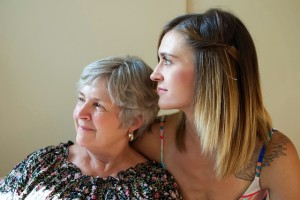- Calls to this hotline are currently being directed to Within Health, Fay or Eating Disorder Solutions
- Representatives are standing by 24/7 to help answer your questions
- All calls are confidential and HIPAA compliant
- There is no obligation or cost to call
- Eating Disorder Hope does not receive any commissions or fees dependent upon which provider you select
- Additional treatment providers are located on our directory or samhsa.gov
Expressing Feelings Effectively to Family Members

Contributor: Courtney Howard, BA, writer for Eating Disorder Hope
Open communication is often difficult for individuals coping with an eating disorder. There is typically a natural urge to suppress uncomfortable feelings and avoid confrontation.
Those in recovery might be developing communication skills and other tools to foster healthy self-expression and improve interpersonal relationships. Practicing how to communicate effectively and express emotions, whether good or bad, can benefit individuals and their relationships.
Communicating with Family Members
Healthy relationships require open communication. Without this, relationships might seem strong from afar, but they are likely hollow in one way or another. Eating disorders often strip people of their ability to be truly honest and open, as they thrive on secrecy and isolation. Being truthful about uncomfortable feelings during the holidays is vital during recovery and can improve relationships with friends and family.
Author Susan Heitler, Ph.D., explains, “…expressing feelings in a safe way can lead to our feeling more connected, especially to loved ones. Knowing how to express feelings tactfully therefore is vital if you want to feel close to people and be able to sustain your intimate relationships.”
Encouraging the use of “I feel…” statements over “You make me feel…” statements, Dr. Heitler believes that an individual must acknowledge his or her emotions without placing blame on others.
In the context of eating disorder recovery, open and honest communication is especially key. This includes individuals feeling free to express their truths, but also allowing loved ones to do the same. Either party bottling up their emotions will end up having a negative effect on the relationship in the long-term.
Improving Communication Skills
 Effectively communicating means that an individual must remove his or her “everything is fine” mask and express underlying emotions, however controversial they might be. Developing communication skills to address uncomfortable feelings as they arise can reduce the urges an individual has to cope through engaging in disordered behaviors.
Effectively communicating means that an individual must remove his or her “everything is fine” mask and express underlying emotions, however controversial they might be. Developing communication skills to address uncomfortable feelings as they arise can reduce the urges an individual has to cope through engaging in disordered behaviors.
Individuals in recovery might be hesitant to vocalize their feelings, particularly when grappling with triggers. Gaining awareness and acceptance of these feelings can make an individual more comfortable expressing rather than internalizing emotions.
Passive aggression is a defense mechanism that can hurt relationships. Those who engage in passive aggressive behaviors often subconsciously find ways to subtly undermine or hurt the other person while maintaining the appearance of civility. This can occur when an individual does not feel worthy of being heard, which is common among the eating disorder population.
Tina Gilbertson, LPC, a psychotherapist based out of Portland, Oregon, elaborates that passive aggression is a “strategy we use when we think we don’t deserve to speak our minds or we’re afraid to be honest and open.” Self-awareness regarding any passive aggressive tendencies can reduce their prevalence and power.
Communication can take verbal and nonverbal forms. For this reason, it is important that individuals be aware of body language and the effect it can have on the person with whom they are interacting. Body language can set the tone for a conversation or event, particularly in family settings.
Family Dynamics
 Expressing emotions to loved ones can strengthen relationships. Engaging in active listening and applying respect, including self-respect, will make this process more effective.
Expressing emotions to loved ones can strengthen relationships. Engaging in active listening and applying respect, including self-respect, will make this process more effective.
Individuals in recovery are encouraged to practice open communication and welcome the same from family members and loved ones. This will likely include hearing things that they do not want to hear, but accepting the feelings that result and handling any conflicts with healthy communication can reduce their fallout. This type of confrontation is often helpful in recovery, mending relationships that were once broken by the eating disorder.
If an individual’s loved ones are unable, for whatever reason, to participate in effective communication, it is not his or her burden to carry. Recognizing that this might be the reality and having healthy coping mechanisms at the ready can ensure this does not lead an individual to engage in disordered behaviors. In this sense, managing expectations without making assumptions is key.
Feeling free to honestly express emotions can be empowering and exhilarating for those in recovery. A past bound by secrecy and masking emotions can be replaced by actively communicating thoughts and feelings by engaging in self-expression. Implementing these tools has the potential to improve an individual’s confidence and strengthen relationships with loved ones this holiday season.
Community Discussion – Share your thoughts here!
Have you or your loved one struggled with expressing emotions while in recovery? What tools have helped you express emotions more easily?
The opinions and views of our guest contributors are shared to provide a broad perspective of eating disorders. These are not necessarily the views of Eating Disorder Hope, but an effort to offer discussion of various issues by different concerned individuals.
We at Eating Disorder Hope understand that eating disorders result from a combination of environmental and genetic factors. If you or a loved one are suffering from an eating disorder, please know that there is hope for you, and seek immediate professional help.
Last Updated & Reviewed By: Jacquelyn Ekern, MS, LPC on February 28, 2017
Published on EatingDisorderHope.com

The EatingDisorderHope.com editorial team comprises experienced writers, editors, and medical reviewers specializing in eating disorders, treatment, and mental and behavioral health.

